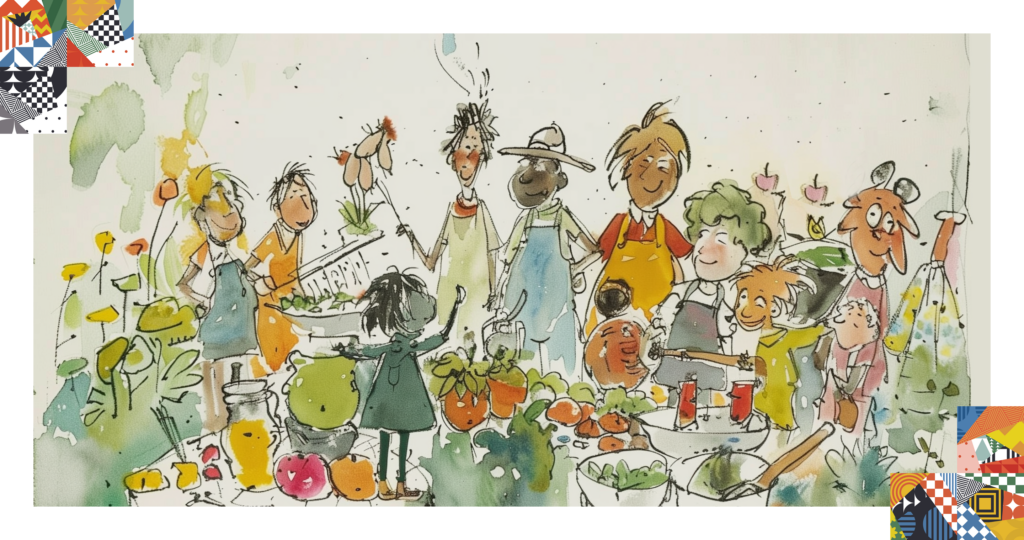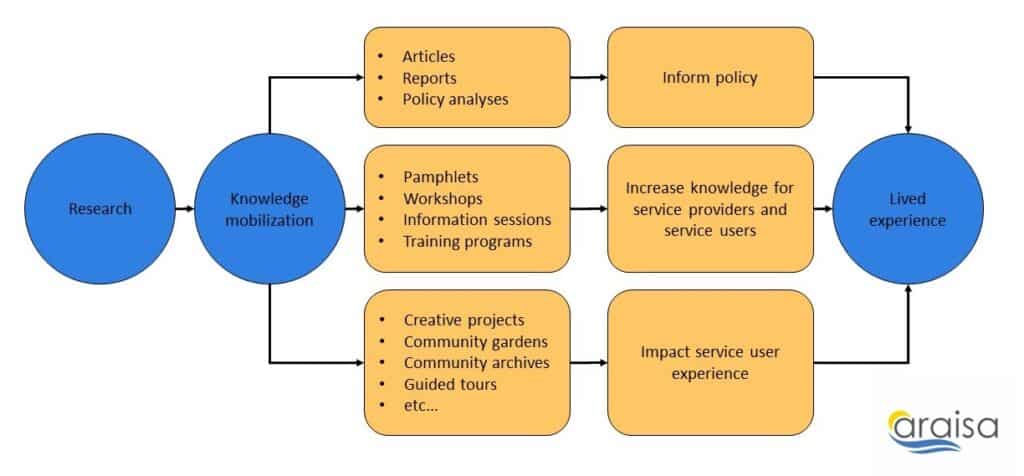Knowledge mobilization: Research as lived experience
February 12, 2024

Research and service delivery are closely entwined. While research produces new information and ideas, services share information with newcomers and help to transform knowledge into lived experience.
This relationship – often referred to as knowledge mobilization – ensures that research has a meaningful and beneficial impact on people’s lives.
Knowledge mobilization involves making research available, accessible, and useful to the communities impacted by it.
Knowledge mobilization involves making research available, accessible, and useful to the communities impacted by it. This can take many forms depending on who is involved and who are the intended users. If research is meant to inform public policy or academic scholarship, it may be sufficient to publish the findings as an article or report. However, research in the settlement and integration sector is often intended to enrich a particular group of service users. In this case, it may be useful to share findings as informational pamphlets or plain-language presentations. But research dissemination is by no means limited to these formats. Knowledge can be mobilized through creative projects, guided tours, community archives, public events, or any other activity that connects research to the people who live it.
Knowledge mobilization does not necessarily look like traditional research activities.
Knowledge mobilization does not necessarily look like traditional research activities. Community gardens, such as the Newcomer Farm Project at MetroWorks, provide a good example of this. MetroWorks is a non-profit in Halifax that offers a variety of community-based services related to employment and skills. Through its Newcomer Farm Project, newcomers – many of whom were farmers in their homelands before immigrating to Canada – regularly come together to cultivate a plot of land at the bottom of Bayers Road. As MetroWorks explains, “women from different cultures and countries have found a shared purpose: to cultivate community, learn new skills, and embrace their new home. [The garden is] a celebration of diversity, friendship, and the boundless potential that emerges when diverse individuals come together.” You can learn more about the project here and here. Other service providers, such as ISANS, also host community gardens for newcomers.
Pies and pie charts aren’t all that different.
A community garden isn’t necessarily what comes to mind when thinking about research, but there are key points of overlap. The Newcomer Farm Project asks many of the same questions that researchers ask when addressing settlement and integration: How can newcomers build community while also developing a sense of belonging in their newly adopted homes? And how can newcomers practice English or French in an informal setting while also gaining practical skills? Researchers use a variety of tools – surveys, interviews, analytical software – to collect data and transform it into practical knowledge. Similarly, gardeners use their own tools – trowels, shears, gloves – to transform soil, sunshine, and water into food. And the goal of both activities is the same: to create something that will enrich people’s lives. Pies and pie charts aren’t all that different.
Gardens – and especially community gardens – are places where people share with and learn from one another. They are places where ideas become lived experience.
As someone who has spent many years conducting interdisciplinary and multimedia research, I am inclined to think of gardening itself as a fully developed and valid form of research. But even for those who take a more traditional approach, gardens can nevertheless be integrated into the research process as a form of knowledge mobilization. Gardens – and especially community gardens – are places where people share with and learn from one another. They are places where ideas become lived experience. As such, they are ideal locations to create knowledge, exchange ideas, and put research to good use.
Knowledge mobilization is a big part of what happens in the settlement and integration sector. Every information session or training program is a form of knowledge mobilization. This can look like community gardens but also language classes, mentorship programs, computer literacy workshops, integration guides, among many others. None of these services would be possible without research, and research would be impractical without these services. More information and resources about knowledge mobilization can be found at Dalhousie University, the Social Sciences and Humanities Research Council, and on many university websites.

Jason Chalmers, PhD
Research Lead / Responsable de la recherche

About the Author
Jason Chalmers
Jason Chalmers holds a PhD in Sociology from the University of Alberta and was a Postdoctoral Fellow in the School of Community and Public Affairs at Concordia University. As an interdisciplinary researcher, Jason draws on diverse methodologies and is particularly inspired by creative and community-based practice. Jason’s research interests include Canada’s immigration history, Indigenous-settler relations, and social inequality.
You can reach Jason at jchalmers@araisa.ca
